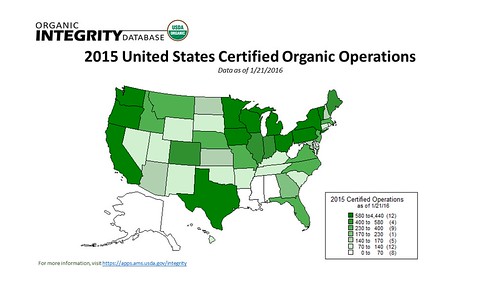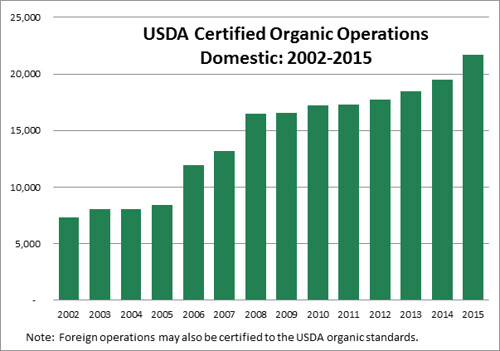
As in past years, the most organic businesses can be found in California and the upper Northwest, the upper Midwest and Northeast, Pennsylvania, New York, and Texas.
Earlier this month, my agency – the Agricultural Marketing Service (AMS) – released data showing that there are now more than 21,000 certified organic operations in the United States, and more than 31,000 around the world. These numbers represent an increase of almost 12 percent between 2014 and 2015, continuing the trend of rapid growth in the organic sector as consumer demand grows.
It’s not just the numbers themselves that are exciting, though. The announcement also marks the first time we released the data through the recently launched Organic Integrity Database, a modernized system for tracking certified organic operations. In the past, AMS’s National Organic Program (NOP) published the number of certified organic operations once a year, using data submitted annually by accredited organic certifying agencies.
With the new database – funded by the 2014 Farm Bill – organic certifiers can add new operations and report changes to existing operations at any time, allowing us to report updated counts of certified organic operations throughout the year.
The Organic Integrity Database, called INTEGRITY, makes it easy for anyone to search for organic farms and businesses by name, certification status, state, country, products, and other factors. By providing updated and accurate information about all certified operations, INTEGRITY will deter fraud, provide data for market research, enable stakeholders to identify market opportunities and make supply chain connections, support the data needs of international trading partners, and establish technology connections with certifiers to share more accurate and timely data.
This project is a great example of how technology investments and strong partnerships support organic integrity and market development. The system was built in less than 10 months with input and feedback from an engaged group of organic certifying agents and other stakeholders.
Moving forward, we’ll continue to refine the database and develop additional modules informed by ongoing stakeholder involvement. With this collaborative and inclusive approach, we’ll continue to protect organic integrity and increase access to information about the organic market.
Access the Organic Integrity Database, see our new reports, and download the full dataset.

There are now more than 21,000 certified organic operations in the United States, and more than 31,000 around the world.
No comments:
Post a Comment
Note: Only a member of this blog may post a comment.